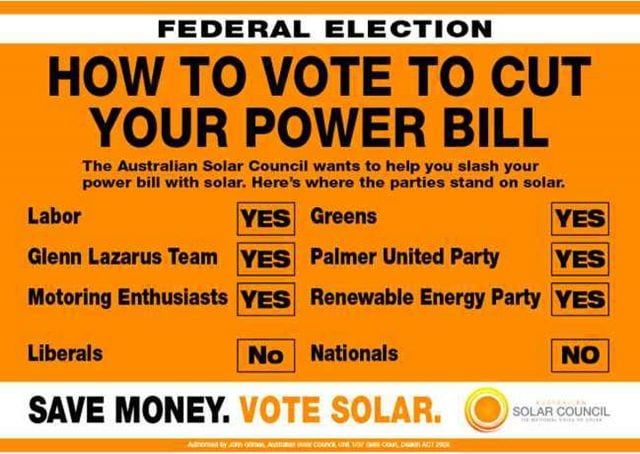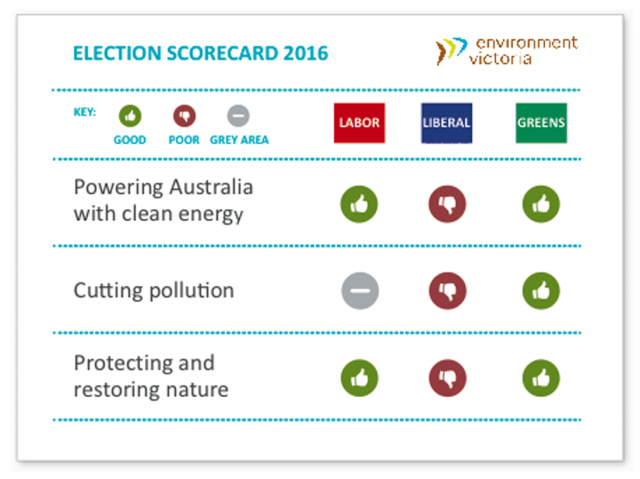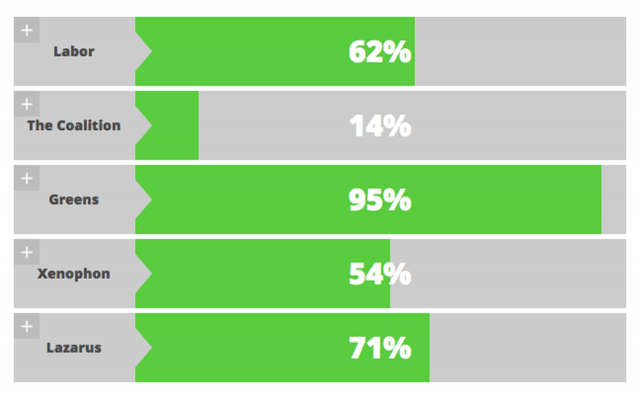By Giles Parkinson, www.reneweconomy.com.au
Renewable energy and climate change have been barely more than peripheral issues in an extended election campaign that has almost entirely focused on the economy, budget numbers and ‘national security.’
Quite how such issues manage to ignore renewable energy and climate change as central components probably tells us more about the inability of mainstream media to extend their coverage beyond political punditry and their dog-with-a-bone obsession with numbers, deficits and forecasts.
That might be fascinating for an abacus, but it’s not much use to anyone else, particularly with most economic models and budget assumptions redundant from basically the moment they are published.
Meanwhile, fear reigns – fear of refugees and immigrants, fear of deficits, fear over national security, and fear of rising prices, even though a trebling of wholesale electricity prices has barely registered a mention. A campaign centred around a new three-word slogan, ‘jobs and growth’ has ignored the one industry that is most likely to provide both.
So, if renewable energy and climate change are important issues, who to vote for? On the positive side of the ledger, there is actually a reasonably wide voice – depending on whether you want to make a statement, support those who might be able to wield influence in the Senate or a hung House of Representatives, or support those who could conceivably take power.
The only agreement, at least among environmental NGOs and renewable energy lobby groups, is who not to vote for, and that honour goes to the Coalition parties, the Liberals and the Nationals, who appear most likely to retain government.
 This is how the Australian Solar Council is advising its supporters, giving a ‘yes’ recommendation to all but the Coalition, while Environment Victoria takes a similar step with a smaller selection below.
This is how the Australian Solar Council is advising its supporters, giving a ‘yes’ recommendation to all but the Coalition, while Environment Victoria takes a similar step with a smaller selection below.
 And here below this is how the Australian Conservation Foundation scored the major parties and the leading alternatives, including the Greens, the Xenophon Party and the Lazarus party. The Coalition rate last, and the Xenophon Party just scrapes into positive territory, with its support for solar offset by its antipathy to wind energy.
And here below this is how the Australian Conservation Foundation scored the major parties and the leading alternatives, including the Greens, the Xenophon Party and the Lazarus party. The Coalition rate last, and the Xenophon Party just scrapes into positive territory, with its support for solar offset by its antipathy to wind energy.
 The demotion of the Coalition is hardly surprising given their lack of support to renewable energy over the last three years. Efforts to dismantle the renewable energy target were thwarted, but investment came to a stop as the parties negotiated a cut in the target to 33,000GWh to 41,000GWh.
The demotion of the Coalition is hardly surprising given their lack of support to renewable energy over the last three years. Efforts to dismantle the renewable energy target were thwarted, but investment came to a stop as the parties negotiated a cut in the target to 33,000GWh to 41,000GWh.
Since then, the Coalition has also announced plans to strip the Australian Renewable Energy Agency of its remaining $1.3 billion of legislated funding. And while it has retained the Clean Energy Finance Corp (although it is yet to withdraw de-funding legislation), it has taken to using its funds for its election pork-barrelling campaign.
The Coalition also has no renewables target beyond 2020, and still has no climate policy to reach its modest targets of a 26-28 per cent reduction target by 2030. Voters who hoped of more from Malcolm Turnbull see a politician trapped by the powerful far right of his party, and forced to defend policies he once ridiculed.
And it’s not just a federal phenomenon. Coalition ruled NSW is rated as the worst place to invest in renewables, the Coalition government in the Northern Territory is saying ridiculous things about solar, and the Coalition opposition parties are railing against progressive renewable energy policies in Victoria, Queensland and South Australia.
So, who to vote for, and what are their credentials? Here is a brief overview.
There is actually a party called The Renewable Energy Party. It has no seats in the Senate now and is unlikely to, although in the Senate, and with a double dissolution, who ever knows. It is fielding 18 candidates, including in all states apart from South Australia, and in eight lower house seats in Victoria, Tasmania, and Anthony Albanese’s seat of Grayndler in NSW, a result they may be able to influence.
The Renewable Energy Party targets 100 per cent renewables for electricity by 2030, and for 40 per cent of transport needs by 2035. It wants to put pressure on the major parties to redirect the $23 billion in taxpayer-funded subsidies paid annually to oil, gas and coal companies to renewable energy enterprises.
‘We aim to support research into and the development of renewable energy, micro/community/smart electricity grids, public transport including a super fast train line, non-fossil fuel powered public and private transport, and energy efficient technology.’
The Greens have the most comprehensive and ambitious renewable energy targets and policies of any party likely to hold, or share, power in the new parliament.
The Greens aim for 90 per cent renewable energy by 2030, and an 80 per cent cut in emissions, and they will retain ARENA. They have also announced plans for improving access to solar for homeowners, renters and business, including a scheme to put solar on all public housing and $2.9 billion to support the installation of battery storage in one million homes and businesses.
They have also released packages for solar for schools, schemes to support the uptake of electric vehicles, for community energy, and a rewrite of the National Electricity Market rules, which are considered a hindrance to the rapid uptake of renewable energy.
They also, unlike the major parties, have a plan to transition the communities affected by the closure of coal generators, allocating around $250 million to help with the phase out of coal power stations. ‘The world has embraced clean energy,’ the party declares on its home page. ‘It is time (for Australia) to catch up.’
The Australian Labor Party has announced a 50 per cent renewable energy target by 2030, although it has not outlined exactly how it would get there – it has hinted at reverse auctions, a policy pioneered by the ACT government in its push to 100 per cent renewable energy and adopted by the Labor state governments in Queensland and Victoria who also have ambitious targets.
Labor supports the retention of the CEFC, and its proposed 45 per cent cut in emissions by 2030 at least meets what the Climate Change Authority agrees is the minimum needed to meet the Paris agreements. Labor is also proposing a return of emissions trading, but in a different form, with a separate scheme for the energy industry and which may resemble modified version of Direct Action, known as baseline and credit.
On Tuesday, it announced $300 million over three years for a transition fund to help emissions intensive industries modernise and switch to clean energy.
One question mark remains over Labor’s attitude to ARENA. It says that it will keep $300 million of funds for large-scale solar towers and community energy, but will strip the remaining $1 billion. What will it do if the Coalition is returned – support its bid to strip ARENA of remaining funding?
The Nick Xenophon Team (NXT). Nick Xenophon and his party colleagues could be pivotal in the new parliament, and may well hold the balance of power in The Senate, and in the lower house (along with The Greens). They are certainly more likely to support a minority Coalition government if it turns out that way.
Xenophon himself is a known politician, generally supportive of ambitious climate policies, and solar PV and solar thermal in particular, but with an apparent blind spot on wind energy, where he has sided with fringe politicians like John Madigan in pushing for more investigations into the ‘health’ impact of wind farms.
The party describes itself as ‘politics done differently’ and pledges to be in the centre, between Labor and the Coalition. Like Labor, it also supports a 50 per cent renewable energy target by 2030, advocates for emissions trading (baseline and credit), and a gas reservation policy.
But there is concern that Xenophon, who recently repeated his anti-wind position at a public forum in Adelaide, could side with conservatives and push for yet another wind review and create uncertainty in an industry that is desperate for clarity to end the capital strike by investors.
Finally, there are still a few independents who might be worth a vote, depending on your local circumstances.
They include Tony Windsor and Rob Oakeshott, both trying to return to the lower house at the expense of sitting Nationals, Cathy McGowan in Indi seeking to hold off the Liberals’ Sophie Mirabella, and in the Senate, Glenn Lazarus, Ricky Muir and even the Palmer United Party have played key roles in stopping the Coalition from killing off ARENA and other key policies.
Andrew Thaler in the NSW seat of Eden-Monaro is another to look out for. The self-described ‘solar PV mogul’ and his wife own XYZ Solar, which lays claim to the largest private collection of photovoltaic panels in Australia – including 8500 in the Snowy Mountains, 6800 panels at the Hunter Valley’s Singleton Solar Farm, which they bought from the NSW government-owned Ausgrid in 2014, and 1600 solar panels on the Superdome at Olympic Park in Homebush.
Thaler, who has also worked in the coal-fired and hydro generation industries in NSW, told RenewEconomy he has recently agreed to purchase the Queanbeyan Solar farm from Essential Energy and relocate it to Nimmitabel as part of a CSIRO virtual-net-metering trial, this time connecting across two networks. essential to Ausgrid.
Some independents and minor parties not to vote for, at least in regards to renewable energy, including Jacqui (let’s have nuclear) Lambie, Bob Day’s Family First, and David Leyonhjelm’s Liberal Democrats. And for those with more than one policy issue on their mind, the Australian Sex Party says it also supports renewable energy.




It is unfortunate that we are promoting “renewable energy” rather than “energy efficiency”. Energy efficiency which is linked to lowering emissions per unit of energy generated and cost effectiveness. The latter is important as we need to reduce emissions as quickly as possible. This is an engineering problem which is complex and non-linear, in contrast to simple solutions that generate unintended consequences.
Any studies in energy efficiency and emissions indicate optimization is the most effective route but unfortunately this falls short of the activities’ ideologies. The latter is always easy to promote to the public.
The best solution is to study both the Germany and USA energy mix and learn from their mistakes. The ideal that the German model is best for Australia is dangerously misleading. Ignoring their mistakes will be a very costly lesson.
As George Santayana stated “Those who do not know history’s mistakes are doomed to repeat them.”
Most countries that have mandated a large percentage of their energy needs be generated by ‘renewable’ energy, (like Germany) are now regretting and reversing that decision. Don’t be fooled by the simplistic arguments put forward by proponents of green energy, do your own research, and please don’t vote for something that could ruin Australia in the long run. Look at the facts.